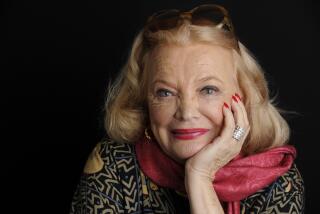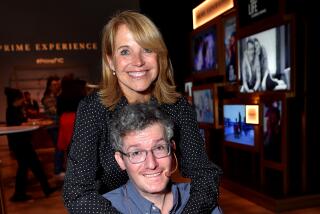Her strength’s in numbers
- Share via
Everything changed for Maria Shriver in the summer of 2003. Her husband announced he was running for governor and later won. She lost her job as an NBC News anchor as a result. Her mother, Eunice Kennedy Shriver, had a stroke. Finally, her father, Sargent Shriver, the founding director of the Peace Corps, was diagnosed with Alzheimer’s disease.
“It was one of those periods where I was like, ‘Whoa, what’s going on?’ ” Shriver said, shifting on the plush sofa of a Beverly Hills hotel suite.
As a way to cope, she wrote a children’s book about the disease -- “What’s Happening to Grandpa?” -- and went to HBO documentary film powerhouse Sheila Nevins to plead with her to adapt it as a film. It took three years, but Nevins eventually relented.
Shriver was named an executive producer of “The Alzheimer’s Project,” a position far less integral to its four films than if she had been reporting the story for NBC News but one that gave her broad influence. She suggested the film “Caregivers,” for instance, and accompanied filmmakers on interviews with top scientists for the “Momentum in Science” segments. Shriver hosted “Grandpa, Do You Know Who I Am?,” which airs Monday night, ad-libbing several candid revelations about her experience watching her father succumb to the disease.
Her celebrity status has played a significant role as well. HBO’s Nevins suspected the attention the documentaries already have received is to Shriver’s credit.
For Shriver, though, “The Alzheimer’s Project” has given her a worthy cause in which to channel her pain.
“People have come up and asked me about it, and I haven’t wanted to talk that much about it,” she said. “Now I feel comfortable doing that without violating my dad’s privacy or dignity. I can share my journey with the hope and goal and mission of helping others in the same process.”
In March, Shriver testified before the Senate Special Committee on Aging, the first time she has appeared before Congress.
In a moving statement to the committee, Shriver called her father a former “walking encyclopedia, his mind a beautifully tuned instrument.”
“Today,” she told the senators, “he doesn’t even know my name. That is the heartbreak and reality of Alzheimer’s. A reality that is terrifying. At 93, he goes to Mass every day and remembers the Hail Mary. He doesn’t remember me. I’d be lying if I didn’t admit that still makes me cry.”
That appearance brought a torrent of mail to her Sacramento office, more than she’s gotten during her five years as first lady of California.
At a candlelight vigil at the Lincoln Memorial attended by caregivers and loved ones of people suffering from Alzheimer’s, held a few days after her committee testimony, Shriver looked around and felt a profound sense of belonging.
“This has enabled me to realize that there are millions of people out there like me that I did not know,” she said. “My whole life I’ve somewhat struggled to find where I belong. I always felt comfortable in journalism. But when I went to the candlelight vigil for all the people dealing with Alzheimer’s, I felt like these people are like me. It’s been really good for me on a lot of levels.”
Sargent Shriver still lives at home in Washington, D.C., with his wife, Eunice. And though Maria still introduces herself to him at each meeting, there are quiet moments that she feels lucky to have.
Once while she sat outside with her father, he mistook the sound of traffic for that of flowing water. Maria stopped trying to convince him otherwise and went with his understanding of it. And suddenly, she was enjoying the sound too.
--
More to Read
The complete guide to home viewing
Get Screen Gab for everything about the TV shows and streaming movies everyone’s talking about.
You may occasionally receive promotional content from the Los Angeles Times.






